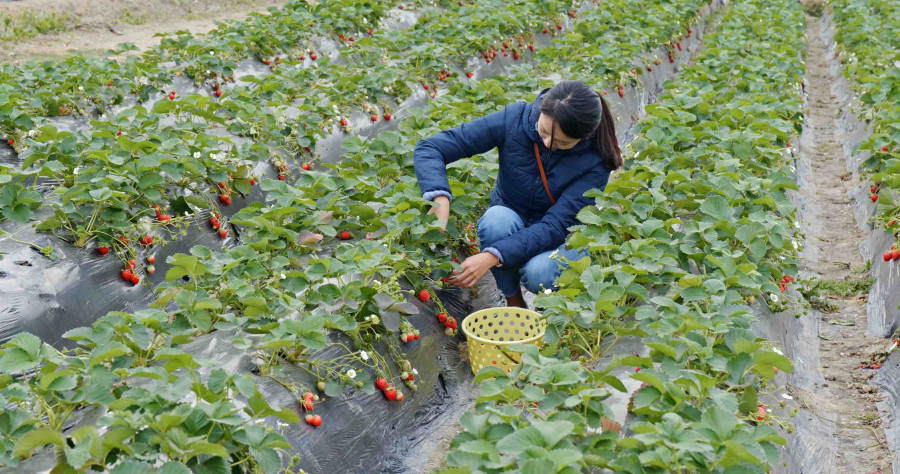Money
Experts call for fair treatment of migrant workers in UK
The UK’s Home Office immigration statistics show that 2,072 Nepalis got seasonal work visas in the first half of 2022.
Pawan Pandey
Advocacy groups and experts warned on Tuesday that migrant agricultural workers in the United Kingdom could face risks comparable to those faced by migrant labourers in the Persian Gulf.
Experts from the UK, Nepal and Bangladesh have called on the British government to create market conditions for fair and ethical recruitment and implement the employers' pay principle in the hiring of workers.
They have suggested carrying out proactive farm inspection and monitoring and reforming the structure of seasonal work visas allowing workers to change sponsors without cost.
In a joint letter to the UK’s Immigration Minister Robert Jenrick last week, human rights activists expressed concerns about continuous abuses associated with the seasonal worker visa route introduced in 2019 to address labour shortages in agriculture, which they said, fails to meet international standards.
Seasonal work in the horticulture sector in the UK consists of picking fruits, vegetables and flowers for six months.
The seasonal worker visa scheme has been extended until 2024, and 45,000 visas are available in the horticulture sector this year, according to the UK government.
The UK’s Home Office immigration statistics show that 2,072 Nepalis got seasonal work visas in the first half of 2022 compared to 456 in the same period in 2021.
Though the scheme operators decided earlier this year not to hire workers from Nepal citing the exorbitant recruitment fees many workers had to pay to secure jobs and their high absconding rates, at least one of the operators has been considering hiring former farm workers from the country this season, insiders said.
For seasonal work in the UK, workers have to pay around Rs42,500 (259 pounds) as application fee besides the cost of their visa and two-way ticket.
However, the scheme ran into controversy last year after multiple reports emerged of workers having to pay exorbitant recruitment fees to secure jobs and many of them not being provided employment for the entire six-month period.
A Nepali worker recruited by AG Recruitment and Management had told the Post earlier that some of his fellow workers had paid as much as Rs1.2 million to Nepali middlemen to get a job.
AG Recruitment has lost its seasonal worker sponsor licence.
A series of media investigations last year revealed widespread abuse of migrant workers, including those from Nepal, on British farms.
Migrant farm workers have also reported discrimination as well as poor working and living conditions, with one in four not having access to a working toilet and nearly two-thirds not feeling safe in their accommodation.
“Migrant workers have long been and will, for the foreseeable future, remain crucial to Britain’s agricultural sector,” said James Lynch, co-director of FairSquare, which has worked extensively on migrant labour abuse in the Gulf, in a statement.
“But the British government’s design and implementation of this visa scheme leaves them horribly exposed to abuse, in a way that increasingly bears comparison to our research on the Gulf.”
Private recruitment firms–known as scheme operators–are responsible for managing the recruitment and placement of workers on UK farms and ensuring their welfare in the country; but the rights groups argued that the UK government cannot abdicate its responsibility for enforcing the rights of workers by delegating it to the private sector.
After unilaterally stopping recruitment from Nepal, at least one scheme operator has begun to recruit workers from Bangladesh.
Anurag Devkota from the Law and Policy Forum for Social Justice, a Nepali human rights organisation that advocates for the rights of migrant workers, said that they have seen, for many years, Nepali workers returning from the Gulf and Malaysia with terrible accounts of their working and living conditions, going unpaid, and all the while having to pay back debts they have taken on to migrate.
“It has been troubling to witness the same phenomena for workers returning from the UK where many expected a better experience,” said Devkota.
The International Labour Organisation’s general principles and operational guidelines for fair recruitment, a globally agreed normative guidance to promote work on fair recruitment, says that recruitment should take place in a way that respects, protects and fulfils internationally recognised human rights.
The general principles also state that no recruitment fees or related costs should be charged to, or otherwise borne by workers or jobseekers, and migrant workers should not be required to obtain the employer’s or recruiter’s permission to switch jobs.
Workers should also have access to free or affordable grievance and other dispute resolution mechanisms in cases of alleged abuse of their rights in the recruitment process, and effective and appropriate remedies should be provided where abuse has occurred.
Barun Ghimire, programme manager at the Law and Policy Forum for Social Justice, told the Post that what they have demanded was nothing new but implementation of internationally accepted norms regarding the rights of migrant workers.
“We want the UK, which actively advocates for human rights and workers’ rights across the globe, to lead by example,” said Ghimire.




 8.22°C Kathmandu
8.22°C Kathmandu














